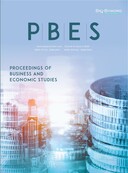Abstract
With the tightening of house purchase policies in recent years, the introduction of financial and land restriction policies, as well as the impact of the COVID-19 pandemic, real estate bombshells are common. Real estate is in the critical stage of transformation and upgrading, and industrial development is facing dire challenges and pressure for survival. As an important part of enterprise management, financial management is directly related to the success or failure of enterprise development. Facing the financial risks emerging in the financial management of the real estate industry at this stage, this review begins from financial management personnel training, investment calculation management, budget management, and asset management in the effort of optimizing the real estate financial management operating mechanism under the new situation and ensuring the healthy and stable development of real estate enterprises, while maintaining core competitiveness.
References
Zhu M, 2022, How to Break the Situation of Real Estate Financial Management. Industrial Technology Innovation, 4(04): 101–103.
Li X, 2021, Problems and Countermeasures in Real Estate Financial Management Under the Background of the New Era. Real Estate World, 2021(17): 67–69.
Bempah BSO, 2017, Determinants of Sound Budgeting and Financial Management Practices at the Decentralized Level of Public Administration. OECD Journal on Budgeting, 2017(2): 109–128.
Dai Y, 2022, Analysis on the Innovation Direction of Real Estate Financial Management in the New Era. Public Investment Guide, 2022(21): 110–112.
Bao H, 2015, Research on Investment Calculation Model of Real Estate Development Projects, thesis, China University of Science Academy (School of Engineering Management and Information Technology).
Arnold V, Benford T, Canada J, et al., 2011, The Role of Strategic Enterprise Risk Management and Organizational Flexibility in Easing New Regulatory Compliance. International Journal of Accounting Information Systems, 12(3): 171–188.
Liu Z, 2021, Risk Prevention and Control of Real Estate Financial Management in the New Era. Investment and Entrepreneurship, 32(18): 70–72.
Armstrong CS, Glaeser S, Kepler JD, 2019, Strategic Reactions in Corporate Tax Planning. Journal of Accounting and Economics, 68(1): 101232.
Johannesen N, 2010, Imperfect Tax Competition for Profits, Asymmetric Equilibrium and Beneficial Tax Havens. Journal of International Economics, 81(2): 253–264.
Brys B, Matthews S, Owens J, 2011, Tax Reform Trends in OECD Countries, OECD Taxation Working Papers, No. 1, OECD Publishing, Paris, https://doi.org/10.1787/5kg3h0xxmz8t-en
Marques M, Rodrigues LL, Craig R, 2011, Earnings Management Induced by Tax Planning: The Case of Portuguese Private Firms. Journal of International Accounting, Auditing and Taxation, 20(2): 83–96.
Cummings J, 2010, Real Estate Finance and Investment Manual, John Wiley & Sons, New Jersey.
Armstrong CS, Blouin JL, Larcker DF, 2012, The Incentives for Tax Planning. Journal of Accounting and Economics, 53(1–2): 391–411.
Zhang Y, 2022, Analysis of Tax Planning for Real Estate Enterprises Based on Risk Management and Control. Accounting of China Township Enterprises, 2022(03): 21–23.
Li W, 2022, Research on Land Value-Added Tax Tax Planning of X Real Estate Enterprises. Aviation Accounting, 4(05): 63–67. https://doi.org/10.19840/j.cnki.FA.2022.05.012
Chen J, 2022, Discussion on Tax Planning of Land Value-Added Tax for Real Estate Enterprises. Business News, 2022(22): 96–99.
Maydew EL, 2001, Empirical Tax Research in Accounting: A Discussion. Journal of Accounting and Economics, 31(1–3): 389–403.
Karayan JE, Swenson CW, 2007, Strategic Business Tax Planning, John Wiley & Sons, New Jersey.
Hondroyiannis G, Papaoikonomou D, 2017, The Effect of Card Payments on VAT Revenue: New Evidence from Greece. Economics Letters, 157: 17–20.
Cárdenas GC, Gamez SG, 2015, The Influence of the Tax System on the Location of Holding Companies in Switzerland. Competitiveness Review, 25(2): 218–237.
Mao C, 2022, Analysis on the Optimization of Land Value-Added Tax Policy Related to Ordinary Residential Development Under the New Situation. International Business Accounting, 2022(09): 69–75.
Wang J, 2021, Analysis of the Accounting Treatment of Land Price Offsetting Sales in Real Estate Development Enterprises. China Township Enterprise Accounting, 2021(12): 31–32.
Lin J, 2022, Research on the Problems and Countermeasures in the Budget Management of Real Estate Enterprises. Business Observer, 2022(22): 79–82.
Chrisman JJ, Bauerschmidt A, Hofer CW, 1998, The Determinants of New Venture Performance: An Extended Model. Entrepreneurship Theory and Practice, 23(1): 5–29.
Banker RD, Chang HH, 1994, Flexibility of Activity Resources and Behavior of Activity Costs. Accounting Review, 1998(28): 23–50.
Lao J, 2022, Analysis on the Budget Management Practice of Real Estate Enterprises – Taking Company A as an Example. National Circulation Economy, 2022(30): 28–31. https://doi.org/10.16834/j.cnki.issn1009-5292.2022.30.002
Sun N, 2022, Analysis on Comprehensive Budget Management of Real Estate Development Companies. Quality and Market, 2022(19): 70–72.
Yang Q, 2022, My Country’s Real Estate Financial Management and Tax Risk Identification Analysis. China Collective Economy, 2022(07): 141–142.
Yu J, 2022, Thoughts on Optimizing the Operational Mechanism of Real Estate Financial Management under the New Situation. Modern Marketing (Early Journal), 2022(11): 31–33. https://doi.org/10.19921/j.cnki.1009-2994.2022-11-0031-0011
Hope J, Fraser R, 2003, New Ways of Setting Rewards: The Beyond Budgeting Model. California Management Review, 45(4): 104–119.
Xue F, 2021, Research on the Current Situation and Countermeasures of My Country’s Real Estate Financial Management under the New Situation. Business News, 2021(35): 58–60.
Pfnür A, Armonat S, 2013, Modeling Uncertain Operational Cash Flows of Real Estate Investments Using Simulations of Stochastic Processes. Journal of Property Investment & Finance, 31(5): 481–501. https://doi.org/10.1108/JPIF-12-2012-0061
Francis RN, Glandon S, Olsen L, 2013, The Persistence of Current and Proposed Measures of Operating Cash Flow. Research in Accounting Regulation, 25(2): 157–168.
Brownell P, 1982, A Field Study Examination of Budgetary Participation and Locus of Control. Accounting Review, 1982: 766–777.
Okafor BN, 2016, Investigating the Problem of Real Estate Financing in Nigeria: A Study of United Bank of Africa, Awka. Journal of Economics and Sustainable Development, 7(14): 63–69.
Squires G, Heurkens E, 2016, Methods and Models for International Comparative Approaches to Real Estate Development. Land Use Policy, 50: 573–581.
Wang J, 2015, Analysis on the Innovation of Real Estate Asset Management. Science and Technology Outlook, 25(04): 180.
Liu Z, 2010, On the Innovation of Real Estate Asset Management. Modern Business, 2010(27): 66–67. https://doi.org/10.14097/j.cnki.5392/2010.27.149
Ruan M, 2019, Problems and Countermeasures in Fund Management of Real Estate Enterprises. China Market, 2019(30): 103–104. https://doi.org/10.13939/j.cnki.zgsc.2019.30.103
